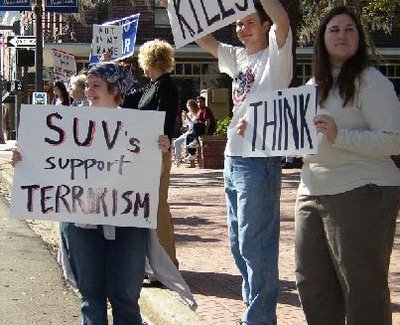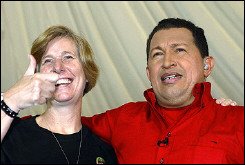 America may be, even with all the restrictions on its citizens, the freest nation on Earth. Even if we aren’t the freest nation, we certainly enjoy a high degree of personal freedom, which is no accident, as our Constitution strongly defends mankind’s unalienable, God-given rights. As a people we are very aware of our freedom to express ourselves and we are very quick to assert that right and to cite our Constitutional protection of it.
America may be, even with all the restrictions on its citizens, the freest nation on Earth. Even if we aren’t the freest nation, we certainly enjoy a high degree of personal freedom, which is no accident, as our Constitution strongly defends mankind’s unalienable, God-given rights. As a people we are very aware of our freedom to express ourselves and we are very quick to assert that right and to cite our Constitutional protection of it.Everyone everywhere can think whatever he or she wants, but not everyone is free to say what he or she wants. Citizens of other nations—Iran, for example—do not enjoy the freedom to express themselves. Iranians can think whatever they want to about, for example, the direction and actions of their government, but they know better than to voice any discontent. The result is that Iran presents a united front; the world believes
 that the Iranian people support what the Iranian government says. That may not be true, of course, and we are told that the people of Iran do not necessarily agree with their government, but we don’t see Iranians carrying signs in the streets protesting their government’s actions.
that the Iranian people support what the Iranian government says. That may not be true, of course, and we are told that the people of Iran do not necessarily agree with their government, but we don’t see Iranians carrying signs in the streets protesting their government’s actions.Here in the United States citizens write letters to the editor; form organizations to lobby for various causes; make public statements on TV and radio and in news publications; march in public demonstrations; and utilize virtually any imaginable vehicle to express their opinions. Elected officials are openly and even harshly critical of each other and of official national policies. The result of this chaotic din is that the world sees the U.S. as a nation without a unified voice, and views the government’s policies as the policies of the relative few in power, not policies supported by the whole of the American people.
Imagine the power that a nation as large and powerful as the U.S. could project if it’s policies appeared to be
 supported by all the people. Instead, the disarray projected to the world through the loud, vitriolic public disagreement that Americans today so greatly cherish works to our national detriment, as it signals to everyone, friends and enemies alike, that we don’t know what we want, and can’t agree on anything. Instead of projecting strength, we project confusion and disunity. Our ability to influence world events is fractionalized; America is weakened.
supported by all the people. Instead, the disarray projected to the world through the loud, vitriolic public disagreement that Americans today so greatly cherish works to our national detriment, as it signals to everyone, friends and enemies alike, that we don’t know what we want, and can’t agree on anything. Instead of projecting strength, we project confusion and disunity. Our ability to influence world events is fractionalized; America is weakened.It is possible to disagree without destroying our national image; it is possible to project unity even as we privately jostle our positions to more accurately reflect what “we the people” think. That requires good judgment. Unfortunately, too many Americans are more concerned with exercising their right to say what’s on their mind than with exercising good judgment. Our freedom allows us to do that.
Freedom misused is a dangerous thing.
Technorati Tags: Ameirca, Freedom, Rights, Responsibility, Politics, Free Speech

No comments:
Post a Comment